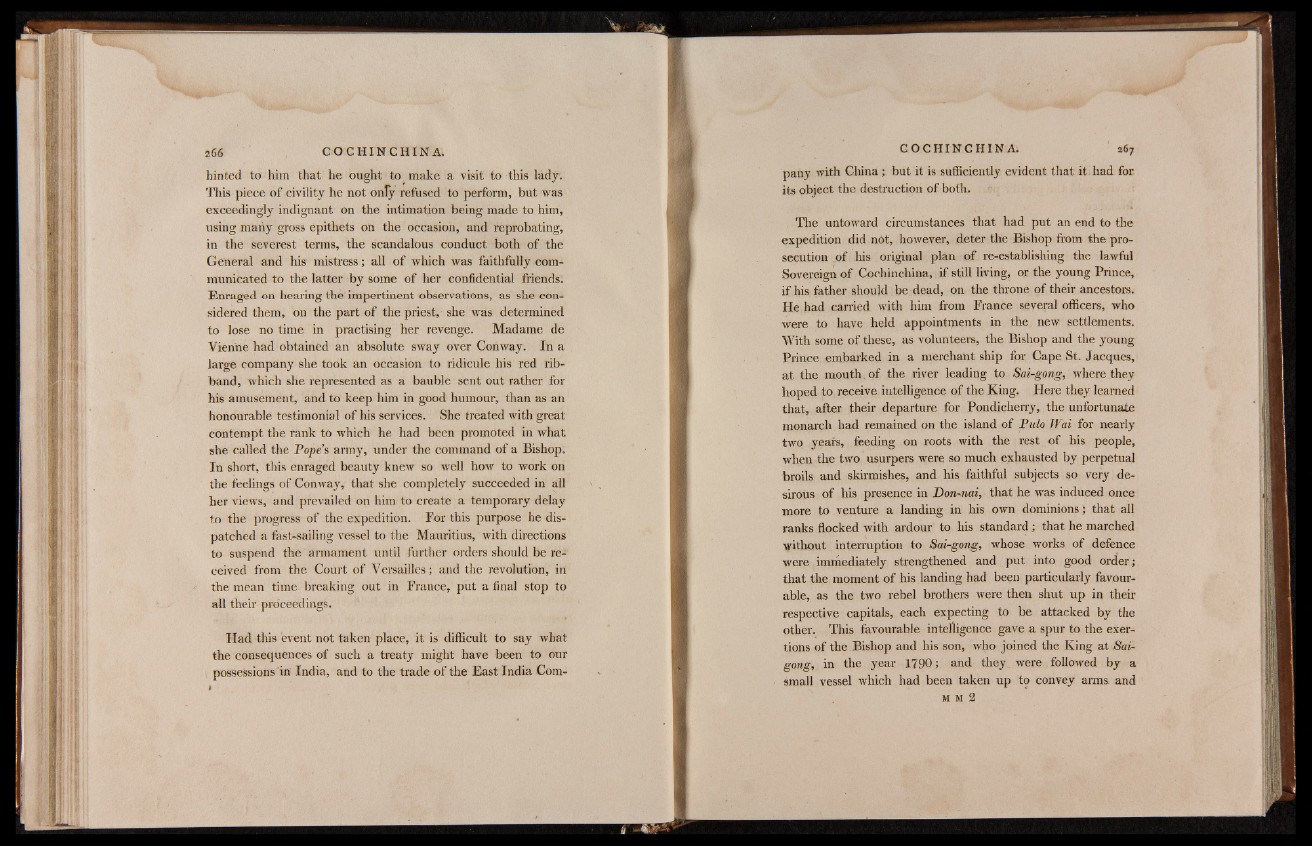
hinted to him that he ought to make a visit to this lady:
This piece of civility he not only refused to perform, but was
exceedingly indignant on the intimation being made to him,
using many gross epithets on the occasion, and reprobating,
in the severest terms, the scandalous conduct both of the
General and his mistress; all of which was faithfully communicated
to the latter by some of her confidential friends.
Enraged on hearing the impertinent observations, as she considered
them, on the part of the priest, she was determined
to lose no time in practising her revenge. Madame de
Vienne had obtained an absolute sway over Conway. In a
large company she took an occasion to ridicule his red ribband,
which she represented as a bauble sent out rather for
his amusement, and to keep him in good humour, than as an
honourable testimonial of his services. She treated with great
contempt the rank to which he had been promoted in what
she called the Pope’s army, under the command of a Bishop.
In short, this enraged beauty knew so well how to work on
the feelings of Conway, that she completely succeeded in all
her views, and prevailed on him to create a temporary delay
to the progress of the expedition. For this purpose he dispatched
a fast-sailing vessel to the Mauritius, with directions
to suspend the armament until further orders should be received
from the Court of Versailles; and the revolution, in
the mean time breaking out in France, put a final stop to
all their proceedings.
Had this event not taken place, it is difficult to say what
the consequences of such a treaty might have been to our
possessions in India, and to the trade of the East India Company
with China; but it is sufficiently evident that it had for
its object the destruction of both.
The untoward circumstances that had put an end to the
expedition did not, however, deter the Bishop from the prosecution
of his original plan of re-establishing the lawful
Sovereign of Cochinchina, if still living, or the young Prince,
if his father should be dead, on the throne of their ancestors.
He had carried with him from France several officers, who
were to have held appointments in the new settlements.
With some of these, as volunteers, the Bishop and the young
Prince embarked in a merchant ship for Cape St. Jacques,
a t the mouth, of the river leading to Sai-gong, where they
hoped to receive intelligence of the King, Here they learned
that, after their departure for Pondicherry, the unfortunate
monarch had remained on the island of Pulo Wai for nearly
two years, feeding on roots with the rest of his people,
when the two usurpers were so much exhausted by perpetual
broils and skirmishes, and his faithful subjects so very desirous
of his presence in Don-nai, that he was induced once
more to venture a landing in his own dominions; that all
ranks flocked with ardour to his standard; that he marched
without interruption to Sai-gong, whose works of defence
were immediately strengthened and put into good order;
that the moment of his landing had been particularly favourable,
as the two rebel brothers were then shut up in their
respective capitals, each expecting to be attacked by the
other. This favourable intelligence gave a spur to the exertions
of the Bishop and his son, who joined the King at Sai-
gong, in the year 1790 ; and they were followed by a
small vessel which had been taken up to convey arms and
m m 2